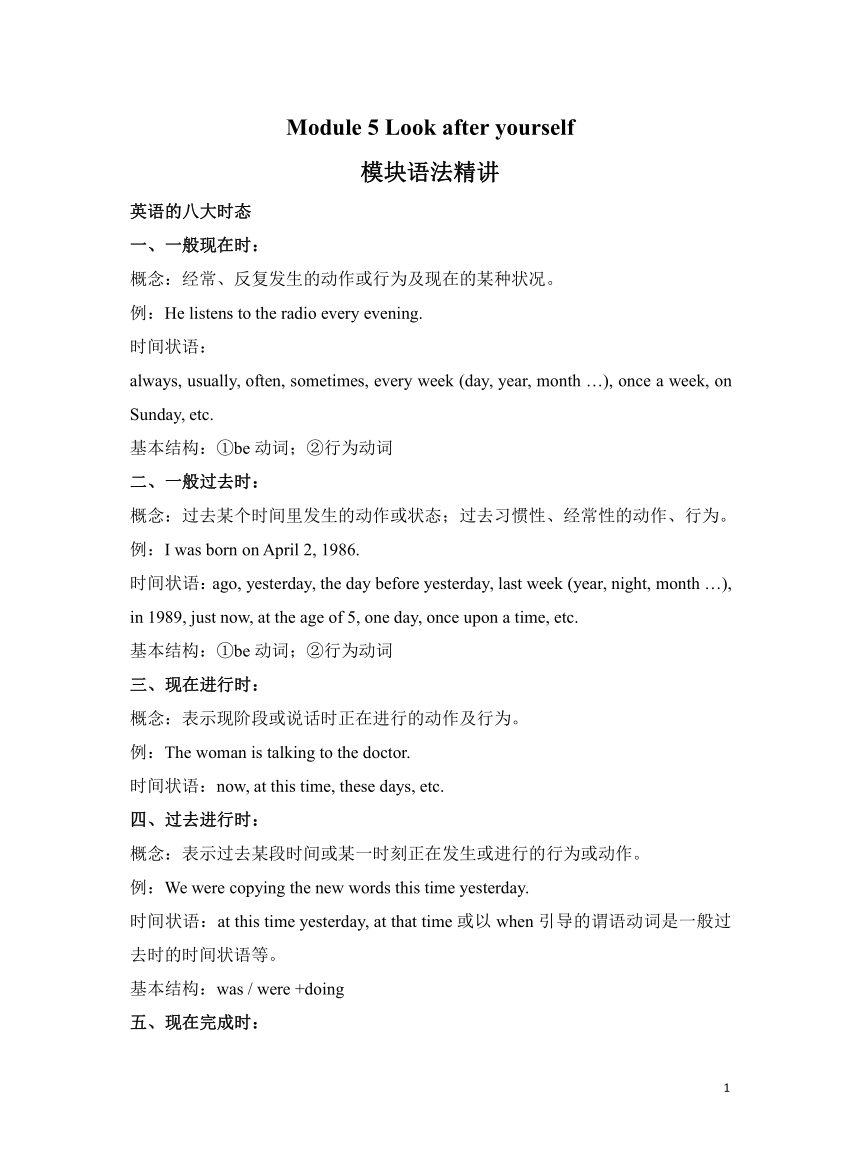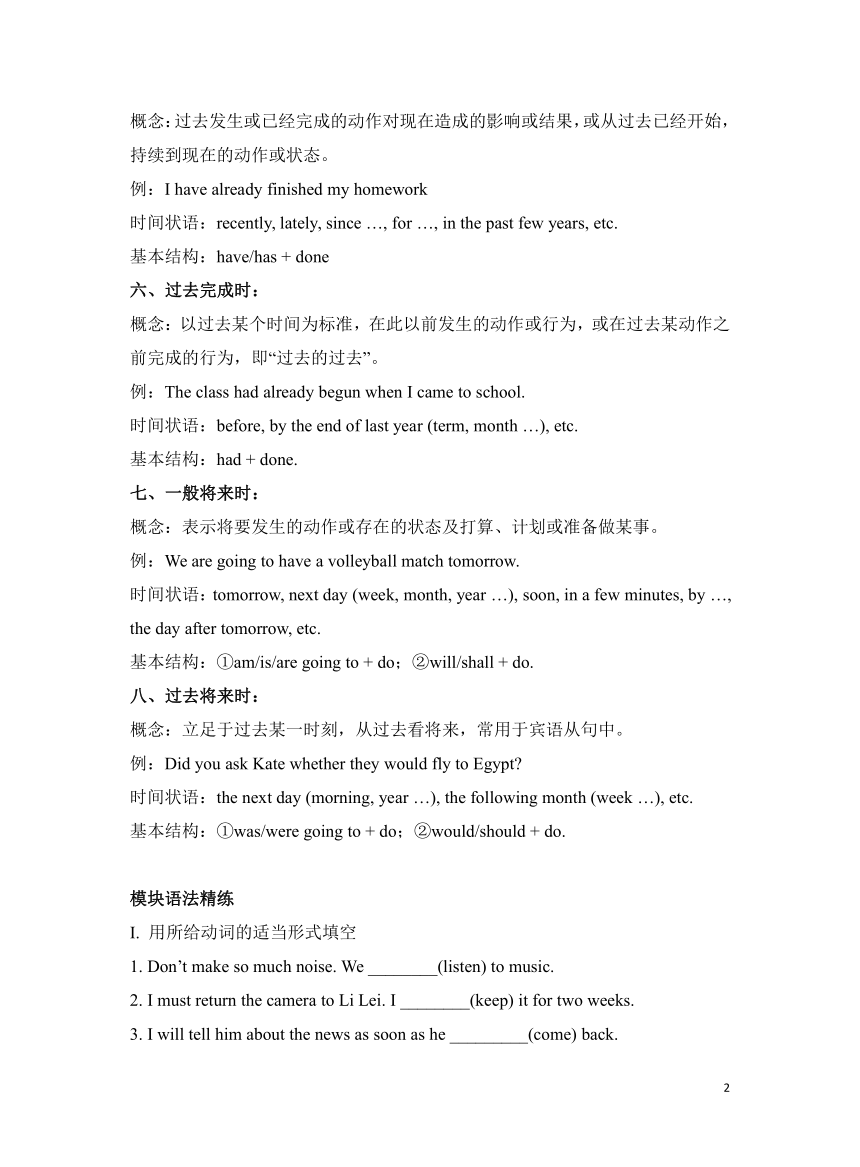外研版英语九年级下册Module 5Look after yourself 模块语法精讲(含解析)
文档属性
| 名称 | 外研版英语九年级下册Module 5Look after yourself 模块语法精讲(含解析) |

|
|
| 格式 | docx | ||
| 文件大小 | 16.5KB | ||
| 资源类型 | 教案 | ||
| 版本资源 | 外研版 | ||
| 科目 | 英语 | ||
| 更新时间 | 2024-02-22 00:00:00 | ||
图片预览


文档简介
Module 5 Look after yourself
模块语法精讲
英语的八大时态
一、一般现在时:
概念:经常、反复发生的动作或行为及现在的某种状况。
例:He listens to the radio every evening.
时间状语:
always, usually, often, sometimes, every week (day, year, month …), once a week, on Sunday, etc.
基本结构:①be动词;②行为动词
二、一般过去时:
概念:过去某个时间里发生的动作或状态;过去习惯性、经常性的动作、行为。
例:I was born on April 2, 1986.
时间状语:ago, yesterday, the day before yesterday, last week (year, night, month …), in 1989, just now, at the age of 5, one day, once upon a time, etc.
基本结构:①be动词;②行为动词
三、现在进行时:
概念:表示现阶段或说话时正在进行的动作及行为。
例:The woman is talking to the doctor.
时间状语:now, at this time, these days, etc.
四、过去进行时:
概念:表示过去某段时间或某一时刻正在发生或进行的行为或动作。
例:We were copying the new words this time yesterday.
时间状语:at this time yesterday, at that time或以when引导的谓语动词是一般过去时的时间状语等。
基本结构:was / were +doing
五、现在完成时:
概念:过去发生或已经完成的动作对现在造成的影响或结果,或从过去已经开始,持续到现在的动作或状态。
例:I have already finished my homework
时间状语:recently, lately, since …, for …, in the past few years, etc.
基本结构:have/has + done
六、过去完成时:
概念:以过去某个时间为标准,在此以前发生的动作或行为,或在过去某动作之前完成的行为,即“过去的过去”。
例:The class had already begun when I came to school.
时间状语:before, by the end of last year (term, month …), etc.
基本结构:had + done.
七、一般将来时:
概念:表示将要发生的动作或存在的状态及打算、计划或准备做某事。
例:We are going to have a volleyball match tomorrow.
时间状语:tomorrow, next day (week, month, year …), soon, in a few minutes, by …, the day after tomorrow, etc.
基本结构:①am/is/are going to + do;②will/shall + do.
八、过去将来时:
概念:立足于过去某一时刻,从过去看将来,常用于宾语从句中。
例:Did you ask Kate whether they would fly to Egypt
时间状语:the next day (morning, year …), the following month (week …), etc.
基本结构:①was/were going to + do;②would/should + do.
模块语法精练
I. 用所给动词的适当形式填空
1. Don’t make so much noise. We ________(listen) to music.
2. I must return the camera to Li Lei. I ________(keep) it for two weeks.
3. I will tell him about the news as soon as he _________(come) back.
4. She _________(draw) a horse when her mother got home.
5. My father said he __________(be) back in a week.
6. We went to the park yesterday and __________(take) a lot of photos.
7. There __________(be) a sports meeting next month.
8. By the end of last month. We ___________(review) four books
II. 单项选择
1. “We’ll have a picnic if it __________ tomorrow.” Have a nice day
A. won’t rain B. will rain C. doesn’t rain
2. As we all know, the Silk Road _____________ China to the west in ancient times.
A. connects B. connected
C. will connect D. is connecting
3. Someone ______ at the door. Can you open it
A. knocks B. knocked
C. is knocking D. was knocking
4. —I called you yesterday evening, but nobody answered.
—Oh, ______ at that time.
A. I’m cooking B. I cooked
C. I cook D. I was cooking
5. There ___________ a sports meet in our school next week.
A. is B. will have C. are D. will be
6. Our teachers are very friendly to us. We _________ friends since three years ago.
A. have been B. have become C. would be
答案
I. 1. are listening 2. have kept 3. comes 4. was drawing 5. would be 6. took 7. is going to be/will be 8. had reviewed
II. 1. C【解析】句意:如果明天不下雨我们就去野餐。在条件状语从句中,根据主将从现的原则,主句是一般将来时态,从句常用一般现在时,故选C。
2. B【解析】句意:众所周知,在古代丝绸之路是连接中国和西方的。in ancient times“在古代”,表示一般过去时。故选B。
3. C【解析】 句意:有人正在敲门,你可以去开一下吗?根据语境可知,现在有人正在敲门,故用现在进行时。故选C。
4. D【解析】句意:—昨天我给你打电话,但没人接。—当时我在做饭。根据句意和at that time可知,我当时正在做饭,故用过去进行时。故选D。
5. D【解析】句意:我们学校下周有一场运动会。Next week“下周”表示将来时态,排除A和C。there be表示某地存在某物,而have表示某人有某物,两者不能共用。故选D。
6. A【解析】句意:我们的老师对我们很友好。我们三年前就成为好朋友了。根据句中的since three years ago“自从三年前”可知,时态用现在完成时态,且与延续性动词连用,故选A。
1
模块语法精讲
英语的八大时态
一、一般现在时:
概念:经常、反复发生的动作或行为及现在的某种状况。
例:He listens to the radio every evening.
时间状语:
always, usually, often, sometimes, every week (day, year, month …), once a week, on Sunday, etc.
基本结构:①be动词;②行为动词
二、一般过去时:
概念:过去某个时间里发生的动作或状态;过去习惯性、经常性的动作、行为。
例:I was born on April 2, 1986.
时间状语:ago, yesterday, the day before yesterday, last week (year, night, month …), in 1989, just now, at the age of 5, one day, once upon a time, etc.
基本结构:①be动词;②行为动词
三、现在进行时:
概念:表示现阶段或说话时正在进行的动作及行为。
例:The woman is talking to the doctor.
时间状语:now, at this time, these days, etc.
四、过去进行时:
概念:表示过去某段时间或某一时刻正在发生或进行的行为或动作。
例:We were copying the new words this time yesterday.
时间状语:at this time yesterday, at that time或以when引导的谓语动词是一般过去时的时间状语等。
基本结构:was / were +doing
五、现在完成时:
概念:过去发生或已经完成的动作对现在造成的影响或结果,或从过去已经开始,持续到现在的动作或状态。
例:I have already finished my homework
时间状语:recently, lately, since …, for …, in the past few years, etc.
基本结构:have/has + done
六、过去完成时:
概念:以过去某个时间为标准,在此以前发生的动作或行为,或在过去某动作之前完成的行为,即“过去的过去”。
例:The class had already begun when I came to school.
时间状语:before, by the end of last year (term, month …), etc.
基本结构:had + done.
七、一般将来时:
概念:表示将要发生的动作或存在的状态及打算、计划或准备做某事。
例:We are going to have a volleyball match tomorrow.
时间状语:tomorrow, next day (week, month, year …), soon, in a few minutes, by …, the day after tomorrow, etc.
基本结构:①am/is/are going to + do;②will/shall + do.
八、过去将来时:
概念:立足于过去某一时刻,从过去看将来,常用于宾语从句中。
例:Did you ask Kate whether they would fly to Egypt
时间状语:the next day (morning, year …), the following month (week …), etc.
基本结构:①was/were going to + do;②would/should + do.
模块语法精练
I. 用所给动词的适当形式填空
1. Don’t make so much noise. We ________(listen) to music.
2. I must return the camera to Li Lei. I ________(keep) it for two weeks.
3. I will tell him about the news as soon as he _________(come) back.
4. She _________(draw) a horse when her mother got home.
5. My father said he __________(be) back in a week.
6. We went to the park yesterday and __________(take) a lot of photos.
7. There __________(be) a sports meeting next month.
8. By the end of last month. We ___________(review) four books
II. 单项选择
1. “We’ll have a picnic if it __________ tomorrow.” Have a nice day
A. won’t rain B. will rain C. doesn’t rain
2. As we all know, the Silk Road _____________ China to the west in ancient times.
A. connects B. connected
C. will connect D. is connecting
3. Someone ______ at the door. Can you open it
A. knocks B. knocked
C. is knocking D. was knocking
4. —I called you yesterday evening, but nobody answered.
—Oh, ______ at that time.
A. I’m cooking B. I cooked
C. I cook D. I was cooking
5. There ___________ a sports meet in our school next week.
A. is B. will have C. are D. will be
6. Our teachers are very friendly to us. We _________ friends since three years ago.
A. have been B. have become C. would be
答案
I. 1. are listening 2. have kept 3. comes 4. was drawing 5. would be 6. took 7. is going to be/will be 8. had reviewed
II. 1. C【解析】句意:如果明天不下雨我们就去野餐。在条件状语从句中,根据主将从现的原则,主句是一般将来时态,从句常用一般现在时,故选C。
2. B【解析】句意:众所周知,在古代丝绸之路是连接中国和西方的。in ancient times“在古代”,表示一般过去时。故选B。
3. C【解析】 句意:有人正在敲门,你可以去开一下吗?根据语境可知,现在有人正在敲门,故用现在进行时。故选C。
4. D【解析】句意:—昨天我给你打电话,但没人接。—当时我在做饭。根据句意和at that time可知,我当时正在做饭,故用过去进行时。故选D。
5. D【解析】句意:我们学校下周有一场运动会。Next week“下周”表示将来时态,排除A和C。there be表示某地存在某物,而have表示某人有某物,两者不能共用。故选D。
6. A【解析】句意:我们的老师对我们很友好。我们三年前就成为好朋友了。根据句中的since three years ago“自从三年前”可知,时态用现在完成时态,且与延续性动词连用,故选A。
1
同课章节目录
- Module 1 Travel
- Unit 1 We toured the city by bus and by taxi
- Unit 2 It's a long story.
- Unit 3 Language in use
- Module 2 Education
- Unit 1 They don't sit in rows.
- Unit 2 What do I like best about school?
- Unit 3 Language in use
- Module 3 Life now and then
- Unit 1 They sometimes work harder.
- Unit 2 I think life is better today.
- Unit 3 Language in use.
- Module 4 Rules and suggestions
- Unit 1 You must be careful of falling stones.
- Unit 2 we must keep the camp clean.
- Unit 3 Language in use.
- Revison A
- Module 5 Look after yourself
- Unit 1 We'd better get you to hospital.
- Unit 2 Get off the sofa!
- Unit 3 Language in use.
- Module 6 Eating togethe
- Unit 1 When is the school-leavers' party?
- Unit 2 Knives and forks are used for most Western
- Unit 3 Language in use
- Module 7 English for you and me
- Unit 1 Have you ever been to an English corner?
- Unit 2 We all own English.
- Unit 3 Language in use
- Module 8 My future life
- Unit 1 Here's to our friendship and the future
- Unit 2 I know that you will be better at maths.
- Unit 3 Language in use
- Revison B
